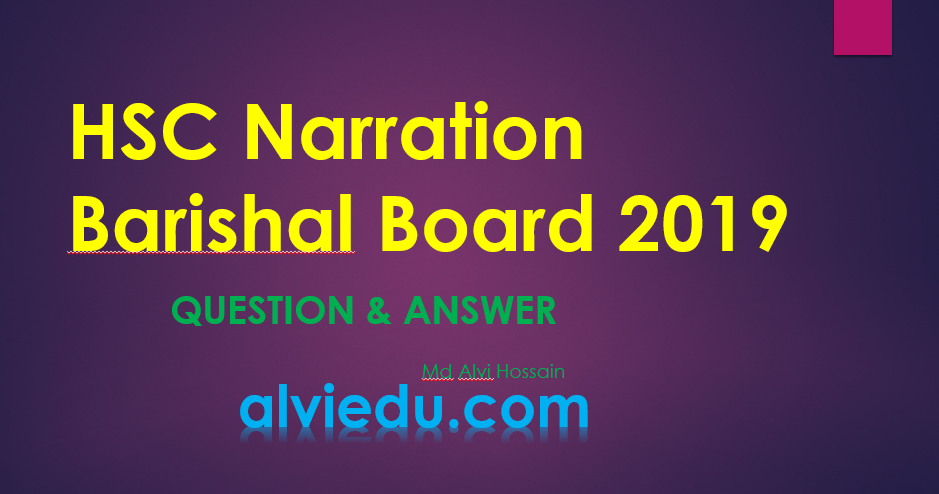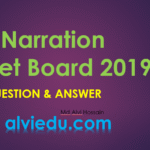HSC Narration Barishal Board 2019 question & answer…..HSC Narration Barishal Board 2019 question & answer…..
Passage narration is the process of converting a dialogue or conversation written in direct speech into indirect speech, maintaining correct tense, pronoun, and structure changes to ensure grammatical accuracy.
visit us our youtube dailystory0.5
Question
Returning home, my mother said to me, “Your progress in studies is very slow. You always move about with a group of your friends. Aren’t you idling away your time with them? Can’t you be more serious?”
“I am sorry and I will amend myself,” I replied. (alviedu)
Answer
Returning home, my mother told me that my progress in studies was very slow. She added that I always moved about with a group of my friends. Then she asked me if I was idling away my time with them. She also asked if I could not be more serious. I replied that I was sorry and that I would amend myself.
Read more Hsc narration dhaka board 2024 question and answer
Explanation & Breakdown
To convert this passage from direct speech to indirect speech, several changes are required in terms of tense, pronoun usage, and time/word adjustments. Let’s analyze the process step by step.
1. Tense Changes
- In direct speech, present tenses (“are,” “aren’t,” “can’t”) shift to past or past perfect (depending on context).
- e.g. “Your progress in studies is very slow” becomes “my progress in studies was very slow” (present → past).
- “You always move about with a group of your friends” remains similarly phrased, though “always move” becomes “always moved” in past perspective.
- Questions with present tense (“Aren’t you idling…?”, “Can’t you be more serious?”) also change:
- “Aren’t you…” → “…if I was idling away…”
- “Can’t you…” → “…if I could not be more serious.”
2. Pronoun & Point of View Adjustments
- “My mother said to me” → “my mother told me” in indirect speech. The pronouns “my” and “me” remain appropriate because the speaker and listener are the same, but the verb reporting changes.
- “Your” becomes “my” since the mother is speaking to the I‑speaker.
- “I always move…” → “I always moved…” (keeping the perspective of the speaker).
- In questions, “you” (mother addressing child) becomes “I” (child’s perspective when reporting).
3. Changes of Questions and Their Structure
- Direct questions (“Aren’t you idling away your time…?”, “Can’t you be more serious?”) become indirect yes/no questions, introduced by “if” or “whether.”
- The verb tense in these questions changes accordingly (present → past).
- Auxiliary verbs adjust: “aren’t” becomes “was … not” (i.e., “if I was not idling…”), “can’t” becomes “could not be more serious.”
4. Reporting Verbs & Sequence
- Use “told,” “added,” “asked,” “replied” as reporting verbs for statements, additional remarks, questions and replies respectively.
- The order or sequence: first mother’s comments and questions, then the answer (“I replied…”).
5. Final Polished Version
Putting it all together in an answer helps maintain clarity, coherence, and correct grammar:
Returning home, my mother told me that my progress in studies was very slow. She added that I always moved about with a group of my friends. Then she asked me if I was idling away my time with them. She also asked if I could not be more serious. I replied that I was sorry and that I would amend myself.
- Narration is the grammatical process of converting direct speech into indirect speech. It involves changing the tense, pronouns, and time expressions while maintaining the original meaning. Narration helps report someone’s words without quoting them directly. It is essential in both spoken and written English for clear and formal communication.










